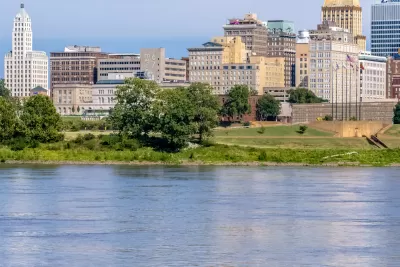One of the city’s biggest assets is its riverfront, but equity and inclusion need to be an important part of what development brings to residents and communities.

Carol Coletta of the Memphis River Parks Partnership writes that Memphis has not taken full advantage of the development and investment potential of the riverfront property along the Mississippi River. The organization, she says, is not funded specifically to pursue equity strategies, but the city's high levels of poverty and segregation means this aspect of its work cannot be ignored. "Instead, we must integrate equity into all that we do, and we must do it within existing financial constraints."
She outlines the model that guides the work of the partnership. Staff development involves providing a living wage and advancement opportunities, and contractor development supports minority- and women-owned businesses. The organization has also made community engagement a top priority, says Coletta. "We believe in the importance of inviting community members in, not just as consumers, but as shapers and stewards of the riverfront."
The riverfront needs to be accessible to all residents, and projects need to connect it to surrounding communities, adds Coletta. "In particular, we are leading efforts to define pedestrian and cycling corridors between the riverfront and surrounding neighborhoods, as well as bring attention to the long-overlooked MLK Park south of downtown, to use as an anchor for new investment in the adjacent neighborhood." Free programming is another way the organization is working to promote diversity among users of the riverfront.
"Questions of equity and inclusion are always present, both in the operation of the enterprise and in the riverfront we are attempting to create. Creating a riverfront that works for everyone, every day, is the only way to achieve our mission of harnessing the transformative power of the river for all Memphians," says Coletta.
FULL STORY: How Memphis, Tennessee is transforming the city through its riverfront

Alabama: Trump Terminates Settlements for Black Communities Harmed By Raw Sewage
Trump deemed the landmark civil rights agreement “illegal DEI and environmental justice policy.”

Planetizen Federal Action Tracker
A weekly monitor of how Trump’s orders and actions are impacting planners and planning in America.

Why Should We Subsidize Public Transportation?
Many public transit agencies face financial stress due to rising costs, declining fare revenue, and declining subsidies. Transit advocates must provide a strong business case for increasing public transit funding.

Understanding Road Diets
An explainer from Momentum highlights the advantages of reducing vehicle lanes in favor of more bike, transit, and pedestrian infrastructure.

New California Law Regulates Warehouse Pollution
A new law tightens building and emissions regulations for large distribution warehouses to mitigate air pollution and traffic in surrounding communities.

Phoenix Announces Opening Date for Light Rail Extension
The South Central extension will connect South Phoenix to downtown and other major hubs starting on June 7.
Urban Design for Planners 1: Software Tools
This six-course series explores essential urban design concepts using open source software and equips planners with the tools they need to participate fully in the urban design process.
Planning for Universal Design
Learn the tools for implementing Universal Design in planning regulations.
Caltrans
Smith Gee Studio
Institute for Housing and Urban Development Studies (IHS)
City of Grandview
Harvard GSD Executive Education
Toledo-Lucas County Plan Commissions
Salt Lake City
NYU Wagner Graduate School of Public Service





























